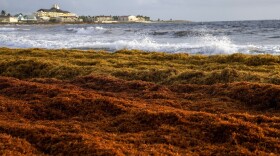-
Floods, wildfires, heat waves and hurricanes cause billions of dollars of property damage each year. Can federal climate scientists help the insurance industry keep up?
-
Warmer sea waters have many far-ranging effects. In the new pattern, some parts of the U.S. could get relief from drought, while others might see fewer hurricanes.
-
Funding from NOAA will help restore 10 sites along Florida’s coral reef, just off of the Florida Keys.
-
Cost, transportation and mobility can prevent someone from taking action during weather events. While officials and community groups are working to close those gaps, human psychology is also part of the problem.
-
Fort Lauderdale's 25 inches of rain is a case of a strong thunderstorm not knowing when to say when. One factor: the atmosphere in our warming planet can hold more moisture that comes down as rain.
-
The new director of the National Hurricane Center is a man with plenty of experience calling big storms. The National Oceanic and Atmospheric Administration announced Mike Brennan will take over immediately.
-
The National Hurricane Center now says Ian reached peak winds of 160 mph when it made landfall.
-
What is sargassum, and is it harmful to our health? We answer these and other questions about the giant blob of seaweed that's making its way to the U.S. east coast.
-
The cooling in the Pacific Ocean has gone on for three years. Its end is usually good news for the U.S. and other parts of the world, including drought-stricken northeast Africa, scientists said.
-
The warmest months were March and November, up 4.5 and 5.3 degrees from the average, respectively.
-
Scientists at the U.S. National Oceanic and Atmospheric Administration (NOAA) delivered a clear message: Climate change is — unequivocally — making extreme weather events worse.
-
A new report from NOAA ranks Hurricane Ian as the third most-costly U.S. hurricane on record.
Play Live Radio
Next Up:
0:00
0:00
Available On Air Stations












